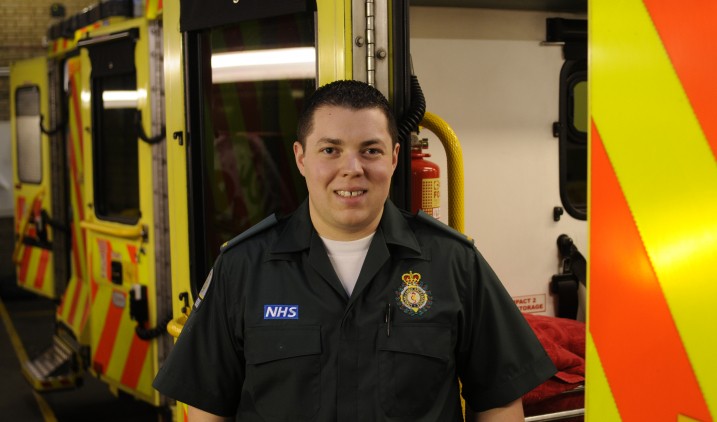Emergency Care Assistants (ECAs) are vital members of the ambulance service, working alongside paramedics to respond to 999 calls and provide crucial pre-hospital care. If you’re seeking a career where you can make a real difference in people’s lives, becoming an emergency care assistant could be the perfect path for you.
A Day in the Life of an Emergency Care Assistant
Imagine being on the frontline of emergency medical services, responding to urgent calls and providing immediate assistance to those in need. As an emergency care assistant, you’ll work as part of a dynamic ambulance crew, partnering with a paramedic to deliver potentially life-saving interventions. Your role is diverse and demanding, attending to a wide range of emergencies, from road traffic accidents to medical crises in homes and public spaces. You’ll utilize expert emergency driving skills to reach the scene swiftly and safely, often covering significant distances to ensure timely patient care.
 Emergency Care Assistant Team
Emergency Care Assistant Team
Under the direct guidance of a paramedic, you will be trained to perform essential emergency care procedures. These critical skills include:
- Controlling severe bleeding: Applying pressure and using dressings to manage life-threatening blood loss.
- Treating wounds and fractures: Cleaning and bandaging wounds, and immobilizing fractures to prevent further injury.
- Managing patients with suspected spinal injuries: Using spinal boards and collars to stabilize and protect the spine.
ECAs are also trained to use a defibrillator, a life-saving device that delivers an electric shock to restore a normal heart rhythm in patients experiencing cardiac arrest. Furthermore, you will be trained to administer a range of medications under the paramedic’s supervision, providing crucial pharmacological interventions in emergency situations.
The nature of emergency care means ECAs must be prepared to handle distressing and emotionally challenging situations. You will encounter individuals who are seriously injured, traumatized, and in severe pain. Examples of emergencies you might attend include:
- Major road accidents: Responding to scenes with multiple casualties suffering from severe and complex injuries.
- Cardiac arrests in public places: Providing immediate resuscitation to individuals experiencing heart attacks in locations like shopping centers.
- Falls and injuries in the home: Assisting elderly or vulnerable individuals who have suffered falls or other medical emergencies at home.
- Domestic violence incidents: Providing care and support in sensitive and potentially volatile situations.
- Pediatric emergencies: Transferring critically ill infants and children to specialist medical facilities.
In addition to providing direct patient care, ECAs play a crucial role in gathering vital information at the scene. This involves communicating with distressed family members, bystanders, and other witnesses to obtain medical history and details about the incident. You must be able to remain calm and professional, even when faced with highly emotional or aggressive individuals.
Beyond emergency response, the role also involves essential vehicle and equipment maintenance. ECAs are responsible for ensuring ambulances are clean, fully fueled, and properly stocked with necessary medical supplies and equipment at the beginning and throughout each shift. Administrative tasks are also part of the job, including completing patient report forms and utilizing communication equipment such as radios and telephones to coordinate with colleagues and control room staff.
Collaboration is key in the ambulance service. ECAs work closely not only with paramedics but also with other ambulance service personnel, including control room operators and dispatchers. Furthermore, you will interact with healthcare professionals in hospitals and with other emergency services, such as fire and rescue teams and the police, to ensure seamless patient care and efficient emergency response.
The standard working week for an ECA is typically 37.5 hours, worked in shifts to provide 24/7 emergency cover, 365 days a year. This means your work pattern will include evenings, nights, early mornings, weekends, and public holidays. ECAs must be prepared to work outdoors in all weather conditions, as emergencies can occur at any time, regardless of the environment.
Earning Potential as an Emergency Care Assistant
Your salary as an emergency care assistant will typically fall within band 3 or 4 of the NHS Agenda for Change pay scales, reflecting your skills and responsibilities within the role. In addition to a competitive salary, working within the NHS offers access to a comprehensive benefits package. This includes a generous pension scheme to help secure your future, health service discounts on a wide range of products and services, and a minimum of 27 days of annual leave per year, plus bank holidays, ensuring a good work-life balance.
Entry Requirements to Become an ECA
While there are no strictly defined entry requirements to become an emergency care assistant, employers generally look for candidates with a solid foundation in literacy and numeracy. Some ambulance services may require formal qualifications such as GCSEs, NVQs, or equivalent certifications to demonstrate your academic abilities. Relevant work experience is highly valued. Experience in care settings, working with elderly or disabled individuals in either paid or voluntary roles, is particularly beneficial. Prior experience in first aid, perhaps through volunteering with organizations like St John Ambulance or the British Red Cross, can also significantly strengthen your application.
To operate an ambulance, you must hold a full, manual driving license. If you obtained your driving license after 1996, you may need to acquire an additional driving qualification to operate larger vehicles and transport passengers safely. Ambulance services utilize vehicles of varying sizes, so it’s essential to carefully check the specific driving license classifications required by the employing trust.
Essential Skills for Emergency Care Assistants
To excel as an emergency care assistant, you’ll need a specific set of personal and professional skills. These include:
- Rapid Situation Assessment: The ability to quickly understand and evaluate emergency situations to determine the best course of action.
- Calmness Under Pressure: Maintaining composure and making sound decisions in stressful and high-pressure environments.
- Confidence and Reassurance: Projecting confidence and providing reassurance to patients, their families, and bystanders during emergencies.
- Emotional Resilience: Developing resilience to cope with the emotional demands of dealing with other people’s distress and trauma.
- Procedural Adherence: Following established protocols and procedures accurately and consistently in emergency situations.
- Teamwork and Independent Work: Effectively collaborating with a paramedic and other team members, as well as being able to work autonomously when required.
- Adaptability and Preparedness: Being ready to enter unpredictable and potentially hazardous situations with confidence.
- Excellent Communication Skills: Communicating clearly and effectively with patients, colleagues, and other emergency services personnel.
- Exceptional Driving Skills: Possessing advanced driving skills to operate emergency vehicles safely and efficiently in challenging conditions.
- Organizational Skills: Being organized and methodical in managing equipment, paperwork, and other logistical aspects of the role.
- Technical Aptitude: Demonstrating the ability to learn and use medical equipment and machinery effectively.
Training and Career Development for ECAs
All ambulance service trusts provide comprehensive initial training programs for newly recruited emergency care assistants. These programs typically last for six to nine weeks and cover a range of essential skills and knowledge, including:
- Safe Patient Handling: Learning correct techniques for moving and handling patients to prevent injuries to both patients and staff.
- Emergency First Aid Expertise: Developing advanced first aid skills to manage a wide range of medical emergencies.
- Basic Patient Care Skills: Acquiring fundamental patient care skills, such as monitoring vital signs and providing basic comfort measures.
- Safe Emergency Driving Techniques: Receiving specialized training in driving ambulances safely and effectively under emergency conditions.
Training involves a combination of classroom-based learning, practical simulations, and real-world scenarios. You will be assessed through practical demonstrations and written examinations to ensure competency. Upon successful completion of your initial training and passing all assessments, you will be assigned to an ambulance station and begin working under the supervision of an experienced mentor before progressing to unsupervised practice.
Career progression opportunities exist for dedicated and ambitious emergency care assistants. With experience, you can advance to roles such as team leader or supervisor, where you will be responsible for managing a team of ECAs, allocating work, and organizing shift schedules.
For those seeking further clinical development, a natural progression route is to train as a paramedic. This requires passing entrance exams and meeting specific academic and professional requirements before being accepted onto a paramedic science degree program. Becoming a paramedic opens doors to a more advanced clinical role with greater autonomy and responsibility in pre-hospital emergency care.
Take the Next Step
Are you ready to embark on a rewarding career as an emergency care assistant? If you are passionate about helping others, thrive in challenging environments, and possess the essential skills and qualities, then this could be the ideal career path for you. Explore the available vacancies in your local ambulance service and take the first step towards a fulfilling and life-saving profession.
[Find a vacancy](link to vacancy page – to be added)
Explore Related Roles
If you are interested in roles within the ambulance service, you might also want to consider these related careers:
- Paramedic
- [Ambulance Care Assistant](link to ambulance care assistant role – to be added)
- [Emergency Medical Technician](link to emergency medical technician role – to be added)


